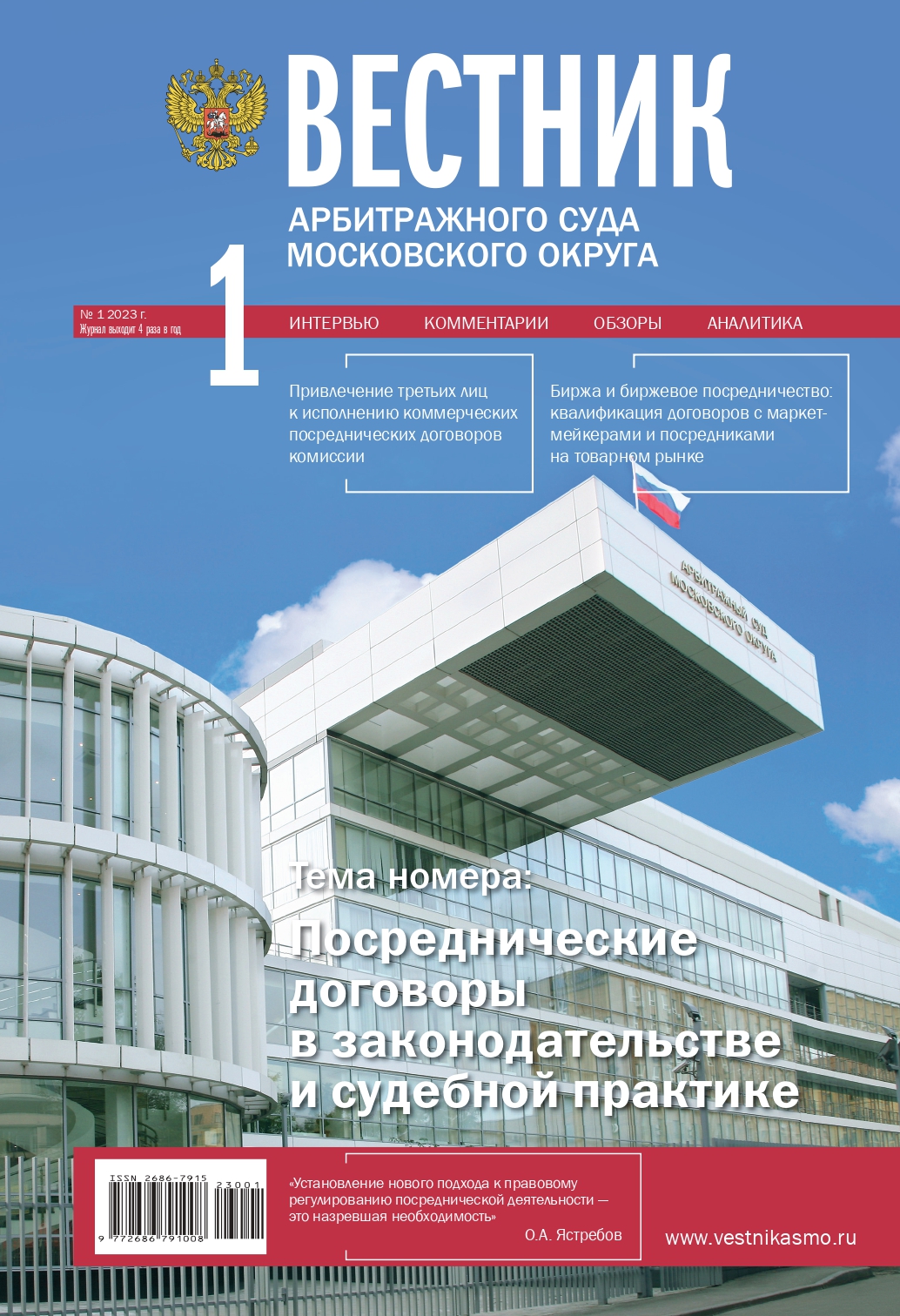Courts News
News of Moscow District Courts
Interview of the issue
O.A. Yastrebov. Establishing a new approach to the legal regulation of intermediary activities is an urgent need
Topicality
Exclusion of a person from a limited liability company as an extraordinary measure of liability
Analytics: Intermediary contracts in law and case law
S.Yu. Filippova
Involvement of third parties in the execution of commercial intermediary commission contracts
The author examines the genesis of the legislation on the contract of commission and the possibility of engaging third parties to perform a contractual obligation. The author analyzes the contract of subcommission, which is not of a derivative nature, and gives practical recommendations for the formation of the terms of this contract.
Keywords: commission contract, subcommission, trade contracts, mediation, trade law
DOI: 10.46279/ASMO.2023.29.43.001
A.A. Dolganin
Exchange and exchange intermediation: qualification of contracts with market makers and intermediaries in the commodity market
The contractual problems of exchange intermediation in Russia are particularly evident due to the rapid growth in the number of unqualified participants in exchange trading and the ongoing risks of volatility, including in the expanding commodity exchange market. The article substantiates the role of professional intermediaries on closed-type exchanges, historically perceived by Russian legal regulation. The importance of market makers for organized trade, the specifics of market maker agreements in the context of intermediary relations are investigated, legal qualification of the market maker agreement as a service contract is critically analyzed. With regard to contracts with intermediaries on the Russian commodity exchange market, the phenomenon conventionally referred to by the author as ‘legal mimicry’ is considered. Taking into account the nature of brokerage regulation, broker agreements and similar contracts used by unlicensed exchange intermediaries are compared.
Keywords: exchange, intermediation, intermediary agreements, broker, market maker, brokerage, broker agreement, intermediary
DOI: 10.46279/ASMO.2023.96.67.002
R.А. Khasanov
Granting the right to use the means of individualization as an element of actual intermediary contracts
Granting the right to use the means of individualization is a common element of contracts that formalize actual (economic) intermediation: distribution and dealer agreements, trust management agreement and commercial concessions agreement. There are questions about the regularity of including such an element in the relevant agreements, its meaning and functions. The research include analysis of the content of actual intermediary contracts, means of individualization, the right to use of which can be granted under such contracts, and formulated conclusions.
Keywords: means of individualization, right of use, intermediation, distribution agreement, dealer agreement, trust management agreement, commercial concession agreement, trademark, commercial designation
DOI: 10.46279/ASMO.2023.22.37.003
K.G. Tokareva
The relationship of the contract of assignment with similar civil law institutions
The article is devoted to the contract of assignment as an independent type of intermediary contracts. The authors present the reasons for the appearance of an assignment contract in Russian legislation and substantiate the independence of its design, relevance and necessity along with commission and agency contracts.
Keywords: contract of assignment, intermediary agreements, power of attorney, commission agreement, agency agreement
DOI: 10.46279/ASMO.2023.92.50.004
R.R. Izmaylov
The system of intermediary relations in the market of housing and communal services
The article is devoted to research the system of intermediary relations in the market of housing and communal services. Special emphasis in the analysis of relations is paid to the problems of contractual regulation of intermediary relations in the market of housing and communal services. Propose to divide the housing and communal services market into three main areas of economic activity in order to establish separate contractual relationships. Possible ways with the improvement of legal regulation of contractual relations in the market of housing and communal services have been established.
Keywords: intermediary relations, intermediary contracts, housing and communal services market, legal provision, system of legal regulation
DOI: 10.46279/ASMO.2023.51.61.005
T.A. Kudelina
Legal relations arising in connection with the conclusion of mediation contracts: the legal regulation of China
The article examines the legal regulation of relations arising from intermediation contracts in China since 1999 up to the present, the peculiarities of the regulation of these legal relations, as well as features of the legal approach of Russia and China to the codification of mediation contracts. Analyzing the legal status of intermediary agreements in China, the author explores the possibility of applying foreign experience in Russian law, taking into account the peculiarities of economic and social development of Russian legislation and legal procedure. The article contains a comparative analysis of changes in Chinese contract law with the introduction of the Civil Code of China, which also touched upon the intermediary contracts.
Keywords: agency contract, commission contract, intermediary contract, legal personality, trade and economic relations, parties to the contract
DOI: 10.46279/ASMO.2023.59.46.006
Analytics: Open Tribune
V.P. Sorokin
Resolution of corporate disputes using mediation procedures
Article is devoted to the resolution of corporate disputes by using mediation as an alternative form of solving corporate conflicts. Relevance of the problem lies in the need to effectively resolve corporate disputes that negatively affect the economic activity of entrepreneurs. The complexity of this category of disputes and the importance of the problem under consideration is emphasized. Different ways of solving corporate disputes, including an alternative form with the use of mediation, are investigated. Mediation is considered in the article as an independent alternative form of consideration and resolution of corporate conflicts. Despite the obvious advantages of mediation in the resolution of this category of disputes, this form is not in sufficient demand.
Keywords: ways of resolving corporate disputes, mediation as an alternative form of dispute resolution, the complexity of corporate disputes, the use of mediation in corporate conflict resolution, mediation procedure for dispute resolution, contradictions in the Law on Mediation
DOI: 10.46279/ASMO.2023.25.30.007
A.A. Solovyov
The Spanish model of legal regulation of judicial ethics
The article deals with the model of legal regulation of questions of judicial ethics in the Kingdom of Spain. The author analyzes the reflection of relevant provisions in the Constitution and other legislative acts of the country, as well as documents of bodies of the judicial community. Particular attention is paid to the Principles of judicial ethics approved by the General Council of the Judiciary of the Kingdom of Spain. The author analyses in most detail the general ethical principles of judges’ work, such as independence, impartiality, professional honesty, respect for human dignity, as well as such aspects of conduct directly connected with the administration of justice as politeness, honesty and transparency.
Keywords: foreign experience, Kingdom of Spain, judicial ethics, judicial community bodies, Principles of judicial ethics
DOI: 10.46279/ASMO.2023.82.79.008
M.D. Belsky
Ensuring the balance of interests in the sale of the enterprise under the insolvency law: the French experience
The author analyses both Russian and French provisions of the legislation on insolvency, regulating the composition of the enterprise. The functions of sale of enterprise under the insolvency law are highlighted. The author proposes measures aimed at changing the legal regime of sale of enterprise in order to preserve the property complex.
Keywords: bankruptcy, French legislation, enterprise, composition of enterprise, sale of enterprise
DOI: 10.46279/ASMO.2023.81.25.009
A.A. Popov
Legal regulation of the civil service in the courts of the French Republic
In the context of considering the issue of the separation of the state judicial service into an independent type of public service of the Russian Federation, the author conducted a study of the legal regulation of the state civil service in the courts of the French Republic, which resulted in the following conclusions: 1) public service in the courts is a type of unified state civil service of the Republic, which is held by the secretaries of the judicial service; 2) the legal basis for the status of these officials is the General Code of the State Civil Service, which defines the general rules applicable to civil servants, as well as Decree No. 2015-1275 of 13.10.2015 ‘On the special status of secretaries of the judicial Service’; 3) the replacement of the position of the secretary of the judicial service takes place through an open competition or a professional exam; 4) promotion the service of civil servants of the court includes promotion and rank (rank); 5) the judicial service secretaries are subject to the provisions concerning the incompatibility of filling the position of a judge with circumstances determined by law.
Keywords: court, judicial service, court staff, court registry, secretary of the judicial service, France, civil service
DOI: 10.46279/ASMO.2023.16.80.010
Scientific and Advisory Council
Minutes № 24 of the meeting of the Scientific Advisory Council of the Moscow District Commercial Court, held in a combined format
Minutes No. 45 of the Presidium of the Moscow District Commercial Court


